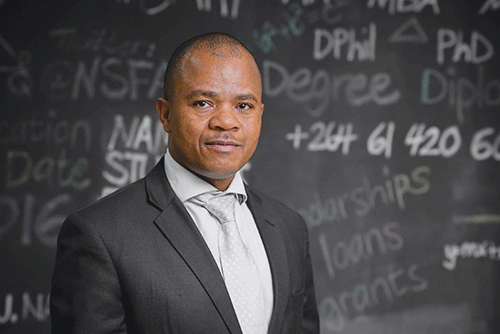Loide Jason
The Namibia Students Financial Assistance Fund hopes an increased budget, to N$1.6 billion, to cater for the expected increased number of applicants during the 2022 academic year, will be approved.
The increased budget is needed for the students as the number of applicants is expected to increase by 2% or more to over 25 000.
Last year, close to 23 000 students applied for funding but only about 16 000 qualified for NSFAF funding. In 2021, the fund received N$1.2 billion in the budget while it received N$1.5 billion the previous year.
Acting CEO Kennedy Kandume made the revelations during the launch of the 2022 online application process.
The executive director in the higher education ministry Alfred van Kent, indicated that the ministry has approached the finance ministry on the budget increase.
“Last year, we have requested extra funds from the Ministry of Finance and we have already approached the ministry and negotiations are ongoing regarding the budget increase,” he explained.
Kandume said they foresee that the number will increase from 24 981 applicants to over 25 000.
“During the previous academic year, the fund received 24 981 applications, which is 15% higher than 21 225 applications received in 2020. The rise in the number of new applicants last year was ascribed to the introduction of grade 11 students who can now enter tertiary institutions.
He explained that the delayed grade 11 and 12 results due to leaked exam papers posed a challenge to the commencement of the 2022 academic year.
“This challenge, coupled with internal operational improvements led to the delay in the commencement of the application process this year but as they say, better late than never,” he said.
Kandume said the online application process is now up and running, from 27 January to 31 March 2022.
He said the fund has received candidate numbers from the education ministry, which will allow the grade 11 and 12 students to apply while waiting for their results.
Kandume further explained the fund has revised the award amount and conditions for aviation training starting this year.
He said aviation training has been subjected to the same conditions and comparable fees as any other field of study.
“However, through industry engagement last year, the fund realised that this amount is not enough even for completion of a private pilot licence, commercial pilot licence as well as examination fees charged by the regulator. This arrangement will benefit 82 continuing trainees. It must, however, be noted that for us to successfully implement these changes, NSFAF will not fund new pilot trainees for the next three years,” explained Kandume.


